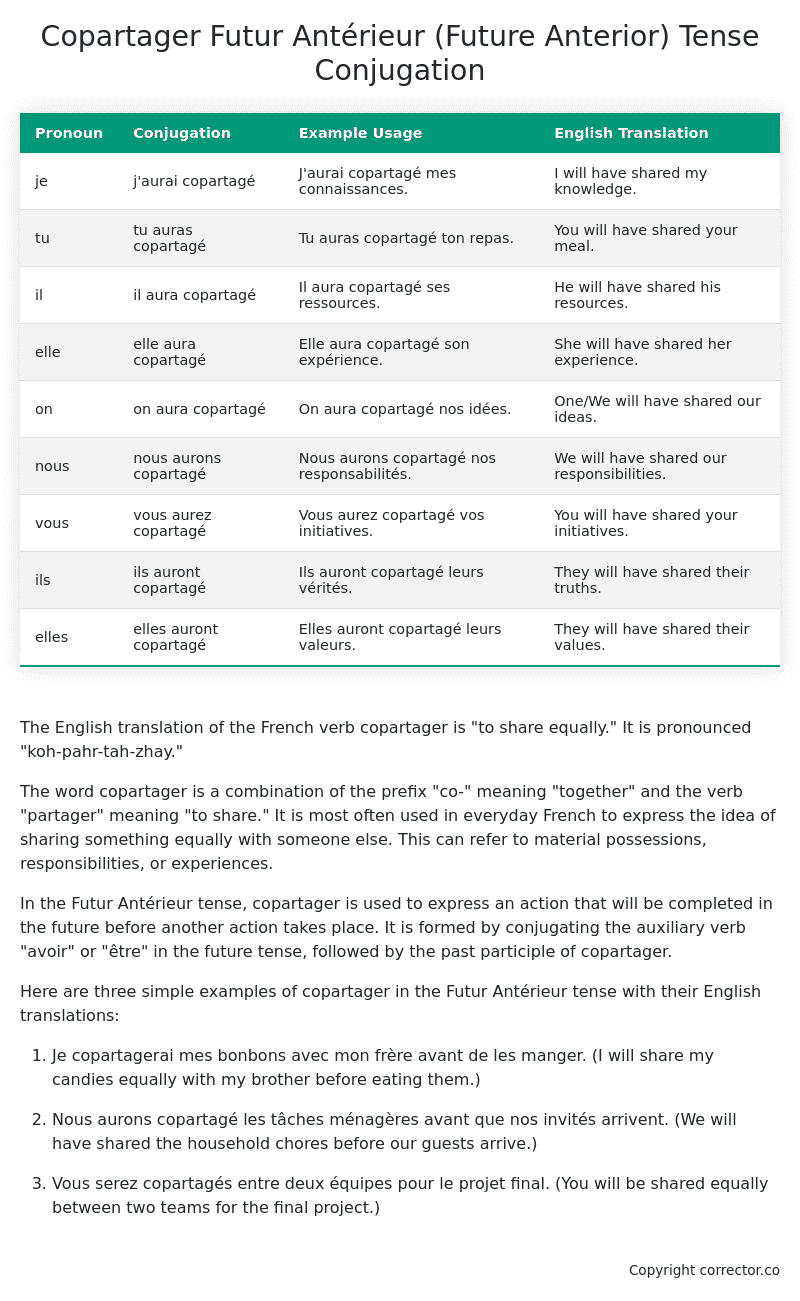Futur Antérieur (Future Anterior) Tense Conjugation of the French Verb copartager
Introduction to the verb copartager
The English translation of the French verb copartager is “to share equally.” It is pronounced “koh-pahr-tah-zhay.”
The word copartager is a combination of the prefix “co-” meaning “together” and the verb “partager” meaning “to share.” It is most often used in everyday French to express the idea of sharing something equally with someone else. This can refer to material possessions, responsibilities, or experiences.
In the Futur Antérieur tense, copartager is used to express an action that will be completed in the future before another action takes place. It is formed by conjugating the auxiliary verb “avoir” or “être” in the future tense, followed by the past participle of copartager.
Here are three simple examples of copartager in the Futur Antérieur tense with their English translations:
-
Je copartagerai mes bonbons avec mon frère avant de les manger. (I will share my candies equally with my brother before eating them.)
-
Nous aurons copartagé les tâches ménagères avant que nos invités arrivent. (We will have shared the household chores before our guests arrive.)
-
Vous serez copartagés entre deux équipes pour le projet final. (You will be shared equally between two teams for the final project.)
Table of the Futur Antérieur (Future Anterior) Tense Conjugation of copartager
| Pronoun | Conjugation | Example Usage | English Translation |
|---|---|---|---|
| je | j’aurai copartagé | J’aurai copartagé mes connaissances. | I will have shared my knowledge. |
| tu | tu auras copartagé | Tu auras copartagé ton repas. | You will have shared your meal. |
| il | il aura copartagé | Il aura copartagé ses ressources. | He will have shared his resources. |
| elle | elle aura copartagé | Elle aura copartagé son expérience. | She will have shared her experience. |
| on | on aura copartagé | On aura copartagé nos idées. | One/We will have shared our ideas. |
| nous | nous aurons copartagé | Nous aurons copartagé nos responsabilités. | We will have shared our responsibilities. |
| vous | vous aurez copartagé | Vous aurez copartagé vos initiatives. | You will have shared your initiatives. |
| ils | ils auront copartagé | Ils auront copartagé leurs vérités. | They will have shared their truths. |
| elles | elles auront copartagé | Elles auront copartagé leurs valeurs. | They will have shared their values. |
Other Conjugations for Copartager.
Le Present (Present Tense) Conjugation of the French Verb copartager
Imparfait (Imperfect) Tense Conjugation of the French Verb copartager
Passé Simple (Simple Past) Tense Conjugation of the French Verb copartager
Passé Composé (Present Perfect) Tense Conjugation of the French Verb copartager
Futur Simple (Simple Future) Tense Conjugation of the French Verb copartager
Futur Proche (Near Future) Tense Conjugation of the French Verb copartager
Plus-que-parfait (Pluperfect) Tense Conjugation of the French Verb copartager
Passé Antérieur (Past Anterior) Tense Conjugation of the French Verb copartager
Futur Antérieur (Future Anterior) Tense Conjugation of the French Verb copartager (this article)
Subjonctif Présent (Subjunctive Present) Tense Conjugation of the French Verb copartager
Subjonctif Passé (Subjunctive Past) Tense Conjugation of the French Verb copartager
Subjonctif Imparfait (Subjunctive Imperfect) Tense Conjugation of the French Verb copartager
Subjonctif Plus-que-parfait (Subjunctive Pluperfect) Tense Conjugation of the French Verb copartager
Conditionnel Présent (Conditional Present) Tense Conjugation of the French Verb copartager
Conditionnel Passé (Conditional Past) Tense Conjugation of the French Verb copartager
L’impératif Présent (Imperative Present) Tense Conjugation of the French Verb copartager
L’infinitif Présent (Infinitive Present) Tense Conjugation of the French Verb copartager
Struggling with French verbs or the language in general? Why not use our free French Grammar Checker – no registration required!
Get a FREE Download Study Sheet of this Conjugation 🔥
Simply right click the image below, click “save image” and get your free reference for the copartager Futur Antérieur tense conjugation!

Copartager – About the French Futur Antérieur (Future Anterior) Tense
Construction
Common Everyday Usage Patterns
Interactions with Other Tenses
For example
Summary
I hope you enjoyed this article on the verb copartager. Still in a learning mood? Check out another TOTALLY random French verb conjugation!


